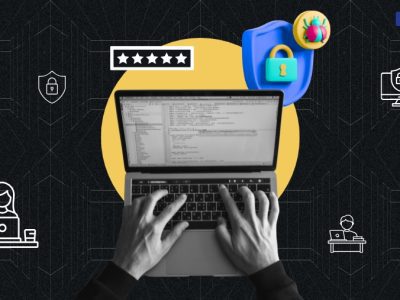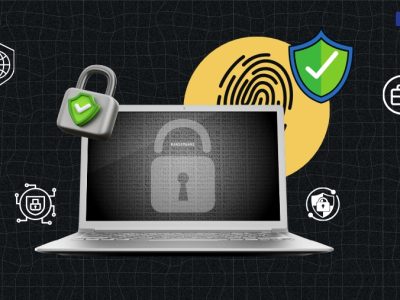Computer Science Vs Cyber Security: Your Pick in 2024

In recent years, there has been an increase (35% growth) in the number of jobs for information security analysts and other cybersecurity-related
professionals. The Bureau of Labor Statistics makes this prediction.
Cybersecurity has indeed emerged as one of the key areas attracting computer scientists and other tech professionals to the field.
-Are you an enthusiast for cybersecurity jobs?
-Can’t decide whether to pick computer science or cyber security?
-Searching computer science vs cyber security on the internet to find a satisfactory answer to your question?
You can use your computer science degree to earn handsomely by opting for one of the roles in the cyber security realm. Or you could also pursue a specialized cybersecurity degree. It happens in both ways.
Yes, you got it right. We are doing a comparative study, a computer science degree vs. cybersecurity degree, to find which would suit you in the long run.
Computer Science Vs Cyber Security: Definition

We start the comparison article, cyber security vs Computer Science, with the individual definition.
Cybersecurity is the area of computer science and engineering. It is more concerned with safeguarding people and organizations from malicious cyber threats and attacks.
Moreover, implementing cybersecurity practices in your personal life or businesses can keep your data safe and confidential.
Cybersecurity specialists use cryptography, threat analyses, and information security processes to protect users and their data from attackers. However, keep in mind miscreants are hovering online, waiting to pounce on the system.
For example, cybercriminals use phishing emails to try and steal your data, credit card information, login credentials, and other valuable personal data. Even a hacker could use social engineering by using emails, texts, and social media to give information to people.
When you are conducting a study of cyber security vs computer science degrees, you have to know both.
So, what is computing science?
It is an area of technology encompassing an extensive range of study areas like computer software development, algorithms, and data science.
The main objective of computer science is understanding the actions or systems computers can handle entirely through automation and AI.
It is an academic discipline with diverse career specializations cropping from it.
Computer Science Vs Cyber Security Degree: Specialization

Many people who work in different organizations are specialists in cybersecurity. In these organizations, these experts carry out work as analysts. In addition, they carry out cyber security audits in an organization.
They also focus on the specific areas of cybersecurity.
In this specialization, the cyber security engineers and analysts analyze data traffic underlying infrastructure.
Its main aim is to maximize protection while preserving functionality.
Another subdivision of cybersecurity is forensic cybersecurity analysis. This involves identifying what happened in a cybersecurity incident within an organization. However, the area of cybersecurity includes:
- Risk Analysis.
- Compliance.
- The Internet Of Things.
- Network security.
- Application security.
Now, we discuss the other side of the coin, which is the specialization in Computer science.
There are many careers in computer science that center around software engineering and programming.
Some software engineers focus on back-end development. Also, some focus on the OS that a user does not see.
On the other hand, some handle front-end development. Users see this area of the program, such as widgets, fonts, and images. However, the roles and specializations in computer science include:
- Data Scientists.
- Computer and support specialists.
- Data Engineers.
- Web designers.
Hence, there are opportunities galore as far as the degree is concerned.
Cybersecurity vs Computer Science: Roles and Responsibilities

This section discusses the roles and responsibilities of cybersecurity and computer science professionals.
Roles and Responsibilities of the Cybersecurity Professionals
Cybersecurity professionals at different levels collaborate to safeguard computer systems, data assets, and networks.
The cybersecurity professionals’ roles are prevalent in different branches of the military. It protects countries and nations from cyber attacks.
They are responsible for protecting edge devices, networks, and infrastructure.
New security threats pop up all the time. However, IT security professionals need to stay up to date with the latest tactics. In addition to these, their responsibilities include:
- Performing regular audits to ensure security practices are compliant.
- Monitoring the application performance and identifying irregular activities.
- Setting up patch management and preventing tools from ducking malicious attacks.
- Implementing the vulnerability management system across all the assets and in the cloud.
Many like you search with an inquisitive mind, “Is cyber security a good career?” Yes, the job is fascinating, provided you take care of these responsibilities diligently.
Roles and Responsibilities of the Computer Science Professionals
Computer science commonly works as software engineers, developers, or technical product leads within an organization.
With their capacities, they design end-to-end strategies. Besides, they design and implement end-to-end strategies and agile PM processes for one digital product, portfolio, or product.
The products could be external and internal, like predictive machine learning algorithms or an internal solution. However, let’s put their responsibilities in a point-by-point manner.
- Designing theories and models to solve problems in computers.
- Conducting research experiments to test new theories.
- Upgrading the computer system and programs by designing new software.
- Evaluating the new computer systems and devices.
- Creating or revising computer algorithms.
- Present the theories and studies to the scientific community in articles or presentations.
- Different models and studies were used to procure new and relevant data.
- Applying data to create applicable insights and solutions.
- Creating a database to store information for the organization.
Computer Science Vs Cyber Security: Key Skill to Master

There are key skills that you have to master if you intend to seek a job, either as a computer scientist or as a cybersecurity professional. However, we try to understand some of the core skills that you ought to master in both cases. Let’s start with Computer Science first:
Technical Skills
Computer scientists rely on technical skills to conduct test systems and research. Their abilities may vary across roles.
You must develop a deeper understanding of the software programs and programming languages. Moreover, computer scientists also tend to be knowledgeable about historical models and computer theories.
Technical Writing Skills
These professionals must have proficiency in technical writing skills apart from the practical application.
Besides they have to document complex concepts and research reports in diverse articles and scientific journals. Besides, they also create easy-to-understand materials for clients and casual readers.
Analytical Reasoning
Computer scientists also analyze models and data to reach scientific conclusions.
They experiment with the latest programs and predict the outcomes of the case.
Analysis skills can help them evaluate functions. It also allows them to create new designs or present findings to others in the field.
For instance, a computer scientist in a biotechnology organization develops new algorithms to help pharmacists manufacture drugs.
Problem-Solving
Computer scientists use diverse skills like problem-solving to ensure that the security or database reduces algorithm bias.
Problem-solving might also be related to the ability to collaborate with other departments. They ensure the production of error fee coding.
Creative Thinking
Creative thinking helps computer scientists develop the most innovative solutions to difficult problems.
Let’s give an example. The computer scientists who work with the software engineers and developers may use their creativity to test the possible outcomes. They also use creativity to solve data-related problems.
How to get into cyber security? Innumerable questions float on the internet platform. Here, we discuss some key skills you have to master if you want to find a good position in this realm.
Cybersecurity Certifications
You must have the certifications that establish the fact that you have a thorough knowledge of the subjects. Furthermore, the certifications help you earn job-ready skills and competency. However, in this section, we discuss a few valued and venerated cybersecurity certifications in 2024.
1. Certified Information System Auditor (CISA)
The very credential makes a job aspirant like you demonstrate skills and experience in assessing vulnerabilities. Besides, the certifications can help you design and implement security controls.
2. CompTIA Security+
CompTIA security+ is for beginners like you. It validates the core skills that are needed in diverse cybersecurity roles.
Moreover, with this certification, you can demonstrate your ability to assess an organization’s security.
Moreover, you can monitor the security of the cloud and the Internet of Things environment.
The best part is that you can understand the legal compliance and risk. Ultimately, with the certification, you can identify and respond to security incidents.
3. GIAC Security Essentials Certifications
The Global Information Assurance Certification (GIAC) is an entry-level security credential. It is meant for those with a strong networking background.
By attaining the certificate, you could work and demonstrate your skills. You could easily play the roles of computer forensic analyst, IT auditor, IT security manager, and penetration tester.
4. Certified Ethical Hacher
Ethical hacking involves a lack of organization and efforts to uncover vulnerabilities before the malicious elements do.
When you learn ethical hacking skills, you can easily demonstrate your competency in attack detection, vectors, penetration testing, and prevention.
Other than these mentioned above, some other very effective security certifications include System Security Certified Practitioner, CompTIA Advanced Security Practitioner, GIAC Certified Incident Handler, and Offensive Security Certified Professional.
Knowledge of Operating Systems and Virtual Machines
A cybersecurity professional must have adequate knowledge of operating systems like Windows, Mac OS, and Linux. Also, as a cybersecurity expert, you must be comfortable working on these operating systems.
One of the key responsibilities of most Cybersecurity experts is penetration testing. It comes with hundreds of tools related to penetration testing, Security research, computer forensics, Malware analysis, and so on.
Coding
You must have strong coding knowledge if you want to work as a cyber security professional. You must master coding languages like C++, C, and low-level programming languages. Apart from these two, you also need to master Python to be considered well-equipped in this realm.
Some other languages you need to master include PHP, HTML, Go lang, SQL, JavaScrpt, and application language.
Cloud Security
Some organizations are looking for professionals with security skills. More organizations look for cloud infrastructure for strong data and run applications.
This includes technology and policy implementation that safeguard cloud-based systems and designs.
Blockchain Securities
Blockchain’s popularity is increasing with time because it offers levels of security. Consequently. Moreover, it is likely to make security inroads into IOT devices, supply chain integration, network controls, and, mobile computing.
The complex nature of the Blockchain makes it difficult for malicious intruders to seep into the system. For cyber criminals to corrupt or destroy a blockchain, they must eliminate data found on the computer user connecting to the targeted global network.
Apart from this Cybersecurity professionals must be well equipped with artificial intelligence, and areas of additional cybersecurity skills like, information security, risk analysis, security audits, laws, and regulations.
You May Like Also:
























